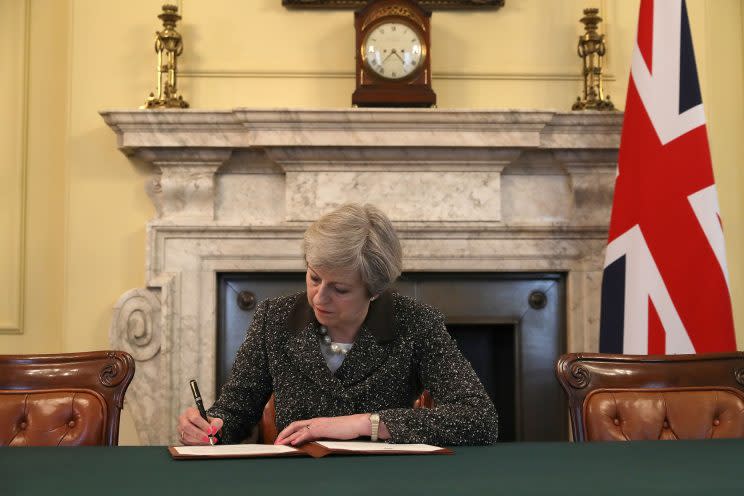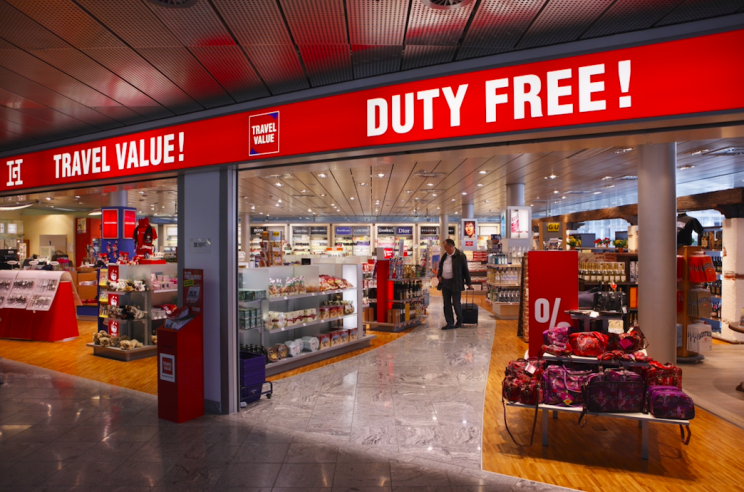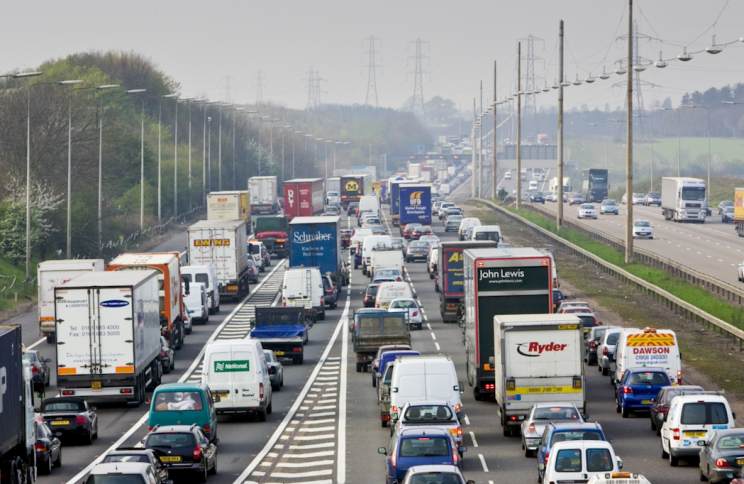Brexit begins... but how will it affect you?

Theresa May has officially signed Article 50 and the formal process of the UK extricating itself from the EU has begun.
It means that negotiations between the two parties can finally get underway and – as trade deals are struck and political decisions reached. Brits will only then begin to fully understand what this mammoth change will be.
Here’s an outline of what’s going on and, more importantly, how it could affect your lives:
What is Article 50?
It is the legal mechanism for a country to leave the EU. Article 50 of the Treaty on European Union states that to withdraw from the EU, a member state has to notify the European Council of its intention. After that, the EU “shall negotiate and conclude an agreement with that State, setting out the arrangements for its withdrawal, taking account of the framework for its future relationship with the Union”. Brexit could still be at least two years away.
The Prime Minister has triggered Article 50 and started the process of leaving the EU. Read the letter: https://t.co/4CfCle4BP1 pic.twitter.com/Gf4DIudIMH
— UK Prime Minister (@Number10gov) March 29, 2017
So the UK is still in the EU?
Yes. There is still a lot of work to be done on a “divorce agreement” unpicking decades of co-operation between the UK and the EU, and attempting to thrash out the free trade deal sought by the Prime Minister. Article 50 states that the treaties relating to EU membership will remain in force until a withdrawal agreement is signed or, failing that, two years from the notification of intent to withdraw. That two-year deadline can be extended, but only if the other 27 EU leaders unanimously agree to grant extra time.
ARTICLE 50: Half of Leave voters want to bring back the death penalty after Brexit
DOVER AND OUT: How the UK national newspapers covered ‘Brexit Day’
ARTICLE 50: Britons are ‘no longer in favour of referendums to make big decisions’
Can the UK change its mind?
That’s a big question, and one with no clear answer, partly because the Article 50 process has never been used before. Lawyers on both sides in the legal battle through the courts said once Article 50 had been invoked it was irrevocable. But Lord Kerr, the diplomat who drafted the measure, has suggested a country could change its mind. European Council president Donald Tusk has also indicated that abandoning Brexit could be an option, claiming that other EU leaders would be sympathetic and “if we have a chance to reverse this negative process, we will find allies”.

So what about your holiday…
There won’t be an immediate change in rules that you will have to research before setting off on your break. Britain will still be bound by the same regulations and procedures as it remains an EU member until 29 March 2019 at the earliest.
So I can still travel to EU destinations as before?
Yes – the usual popular holiday hotspots will be available to Brits, with no extra permits or visas needed. However, this will no doubt change after Brexit. Currently there is no mass of red tape and EU citizens are able to use ‘fast-track’ lanes to get through customs quickly. From March 2019, Brits will likely have to apply online to visit Europe and fill out a European Travel Information and Authorisation System (ETIAS) form before a decision is made whether you can travel to the country or not. You will also likely need to submit to fingerprint checks and have your photo taken – increasing the cost of holidays from the off.
MORE: BBC dodges Brexit coverage criticism by refusing to speak to the BBC
MORE: Brexit latest: Article 50 will be triggered on March 29, Downing Street confirms
Does that mean holiday prices will increase?
The pound is expected to continue its slump for the foreseeable future so there is a strong chance that holiday prices may go up – potentially putting an end to the cheap foreign getaway, at least in the short term. However, many European countries rely on British tourism and are unlikely to increase prices permanently. But with extra red tape to cut through, holidays may start to incur a few hidden costs before the break even begins.

Will I need to get a new passport?
No. Your passports will work as usual but don’t dismiss the notion that all Brits may have to update passports after Brexit. Currently they feature the wording ‘European Union, United Kingdom of Great Britain and Northern Ireland’ across the front. It may be the case that the maroon passports may change colour and style in 2019.

Is duty free set to make a comeback?
Quite possibly – travellers have had no rights to duty or tax-free purchases if they are travelling within the EU since 1999. However, Europe will revert to the same status as the rest of the world after Brexit – meaning cheap booze and cigarettes will make a huge comeback.

So, what will it mean for jobs?
Much depends on what trade deals can be established, whether tariffs are imposed on goods and services trading either way, and whether companies based here move their operations into the EU to ensure the have tariff-free access to the market.
MORE: These 2 tables show capping EU migration post-Brexit would be disastrous for the economy
MORE: What does Brexit mean for drivers, the ‘booze cruise’ and the UK car industry?
Another key area to be addressed is the right to residence and whether this will be protected after Brexit.
The TUC has warned 145,200 NHS and adult social care workers in England risk losing their right to live and work in the UK after Brexit.
How will my rights as a worker be affected?
Many areas of employment law have no origin in Europe and should, therefore, not be affected by Brexit. The minimum wage, claims for unfair dismissal, discrimination in the workplace, the right to strike are all based on UK legislation or non-EU international law.
European laws that have been incorporated into UK law by primary legislation – that is, by Act of Parliament, such as the Equality Act 2010 – would remain in force unless and until they were expressly repealed by Parliament.
Which areas are most likely to be targeted?
The government has talked of a Great Repeal Bill but officials have said rather than one huge piece of legislation, untangling the UK from the EU could take years and as many as 25 bills per Queen’s Speech for a decade.
According to analysis by law specialist Stuart Chamberlain, at Wolters Kluwer, there are six ‘vulnerable’ areas:
Working Time Directive – EU law that sets a (notional) 48-hour maximum working week. In practice, many employers and employees do not adhere to it, but it does offer a level of protection. Businesses would be keen to see the repeal of the maximum 48-hour working week, and some coherence in the calculation of holiday pay.
Agency workers – one of the most likely areas of reform. Chamberlain says business see it as the “most onerous” piece of secondary legislation. It sees employers compelled to pay casual/agency workers the same rate as full-time employees once they have been in post for 12 weeks.
TUPE – Transfer of Undertakings (Protection of Employment) rules protect workers should their role be taken over by a new employer. It means their new boss cannot arbitrarily alter the terms and conditions of their contract. Chamberlain says that could change: “In particular, the ‘harmonising’ of terms and conditions of employment following a TUPE transfer, which is presently unlawful under EU law.”
Discrimination – one area that could be targeted is compensation. A cap on compensation awards for injury to feelings in employment tribunals – similar to that for unfair dismissal – is a contender.
Family friendly measures – much of business believes existing rights to maternity, paternity, shared paternity, parental leave and pay have swung too far in favour or workers. They are a mixture of rights deriving from the EU and rights originating in the UK.
Collective redundancy consultation – employers must consult where they are proposing to make redundant 20 or more employees within a period of 90 days or less. Many commentators expect some tweaking.

What about prices for cars and fuel?
A recent report by PA Consulting Group says the cost of producing a car here could rise £2,370 with a ‘hard Brexit’, which will be passed on to the consumer. Motoring groups have predicted the price of new and used cars is expected to rise once Britain leaves the EU.
But I’ll still have plenty of cars to choose from, right?
Well, maybe not such a wide choice, actually. It could be that European-based manufacturers decide building right-hand drive cars for the UK market is just too expensive, given the level of tariffs they might face. The likes of Renault, Fiat, Seat and others could decide to offer British customers a limited range only of their full suite of makes and models.
Will I be hit with higher insurance costs?
Insurance costs are already high – especially for younger drivers – but if you are a woman motorist, your quote could actually come down. This is because the EU ruled in 2012 that gender should play no role in deciding insurance cover for a range of policies, not just motoring. So, despite evidence to suggest women are, in general, safer drivers and less of a risk than men, they are treated the same. With Britain quitting the EU and the prospect of various laws being abandoned or reversed, this area of equality law is one that could change.
What will happen to the motoring industry?
It’s all in the detail of the deals yet to be struck on trade with Europe post-Brexit. Some 800,000 UK jobs are supported by the industry which built a record 1.72 million vehicles last year, exporting 1.35m of them.
In cities like Sunderland, home to Nissan, it’s a major employer, so much so that there has been talk of a “sweetheart deal” between ministers and car bosses to ensure it stays here post-Brexit. Other brands such as Jaguar Land Rover, Honda and Toyota are all believed to be seeking similar assurances but nothing concrete has yet emerged.

Just this week the rate of inflation increased to 2.3%, the first time it has exceeded the Bank of England’s 2% target since September 2013. Higher food and fuel prices and the weaker value of British currency were cited as factors in the surprise jump.
As Prime Minister Theresa May prepares to trigger Article 50 and begin negotiations on Britain’s departure from the EU, we look at how the cost of your shopping basket could be affected.
Why would Brexit affect the cost of my essential food shop?
A weaker pound has a lot to answer for here.
Food prices have already increased in the aftermath of the Brexit vote, which has sent the the value of the pound on a downward slope.
Supermarkets have been heard citing ‘inflationary pressures’ of late, which, in simple terms, means the rise in the cost of goods or services. This could see outlets faced with rising import costs forced to pass on the difference to customers.

Which of my favourite brands will be affected most?
Brands like Marmite and Toblerone have already been spooked by Brexit. Tesco pulled Marmite and other brands made by owner Unilever from its online site after the manufacturer said it was increasing prices to compensate for the depreciation in sterling. Meanwhile, the makers of Swiss chocolate bar Toblerone controversially changed the shape of the iconic chocolate bar, blaming higher ingredient costs on the new look.
MORE: Don’t blame Brexit for inflation rise… yet
MORE: Is the pound ever likely to recover after Brexit?
In short, food products which are influenced by fluctuations in the exchange rate will likely see price increases.
Other brands and products that have seen price changes include OXO, Bisto, Weetabix, Mr Kipling and Maltesers.
Will this situation get worse once the UK actually leaves the EU?
Until negotiations between the UK and the EU begin, its unclear as to what a post-Brexit Britain will really look like.
Trade agreements are of paramount importance when it comes to making sure UK consumers continue to have access to the products they need and love, without having to compromise price and quality.
What about eating out?
In January, celebrity chef Jamie Oliver announced that six branches of his Jamie’s Italian franchise would shut up shop, blaming Brexit for the closures.
The UK restaurant industry relies heavily on European workers for staffing – one in three workers in the accommodation food services sector are non-UK nationals. According to findings published by the ONS last year, the food services sector has grown by 32% since 2000, with the bulk of new jobs going to non-UK born workers.
Free movement of workers is a key factor in ensuring the UK’s restaurant industry continues to thrive. Recent findings published by consultancy firm Mercer suggest that the UK could face a workforce crisis if severe trade restrictions are imposed on the types and amount of workers allowed to enter the UK.
Should the UK choose to screen eligibility to live in the UK based on job skill, this could cause a serious problem for food establishments where staff are likely to be deemed too low skilled.
How can I protect myself from rising everyday costs?
Gilad Simhony, CEO at mysupermarket.co.uk, offers the following tips to shoppers:
Spend more time researching different supermarket prices before you buy. Spreading your cost across multiple stores is a great way to save money
Use consumer websites to help with your research before you buy to make sure you are getting the best value for money
Try and buy in bulk and keep an eye out on promotions as it is an easy way to buy more for less – especially on non perishable goods like canned food and frozen.
Do a meal plan to ensure you are only buying what you need.

 Yahoo News
Yahoo News 

